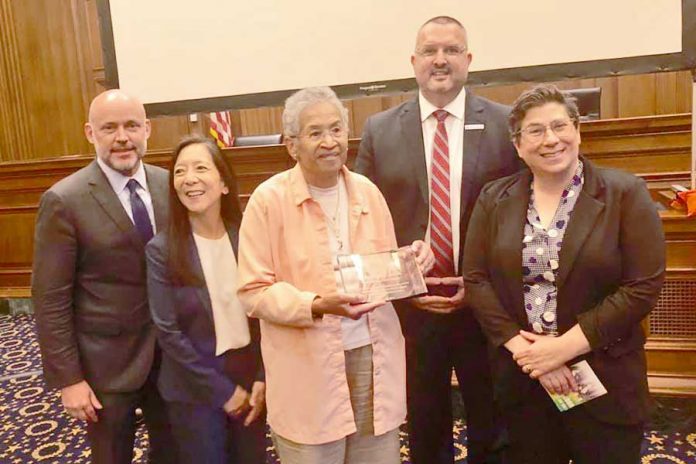Deborah Batts, the first lesbian to serve as a federal judge, passed away in her sleep on Sunday, Feb. 2 at the age of 72. President Clinton appointed Batts to the U.S. District Court for the Southern District of New York in 1994.
Batts was born in Philadelphia in 1947, the daughter of Ruth Batts and James Batts, Jr., a doctor and professor of obstetrics at the Medical College of Philadelphia. She attended the Philadelphia High School For Girls, Radcliffe College in Massachusetts, and Harvard Law School. After graduating from Harvard in 1972, she clerked in U.S. District Court and worked as a litigator before becoming an Assistant U.S. Attorney for the SDNY in 1979. Batts then became the first African-American faculty member at Fordham University when she joined there as a professor in 1984. She was also a member of the Metropolitan Black Bar Association, the LGBT Bar Of New York, and the Sex and Law Committee of the New York City Bar Association, where she worked on family law issues.
Batts’ name had been first proposed for federal judgeship by Senator Daniel Moynihan during the George H.W. Bush Administration. After Bush’s Department of Justice declined to nominate her, citing differences in judicial opinion, Moynihan resubmitted her name to President Clinton. In a May 2019 discussion hosted by Justice For All: Courts and the Community, Batts recalled that Clinton’s Department of Justice was much more supportive, and they helped prepare her for confirmation hearings.
“I am very grateful to them,” Batts said, “because I think that my actually becoming a judge is in great part due to their working with me and on me.”
At the time, the Senate Judiciary Committee included, among others, Senators Ted Kennedy, Strom Thurmond and Arlen Specter. Batts was concerned that her sexual orientation might be an issue for the Committee. The year prior, Sen. Jesse Helms had opposed one of President Clinton’s nominees to the Department of Housing for being a “damn lesbian.” On the day of Batts’ hearing, however, only one senator, Howard Metzenbaum of Ohio, showed up.
“He asked me questions that had nothing to do with anything about my personal life. He asked me what it was like to be a prosecutor, what it was like to be a professor. Then he asked me questions about what my reaction would be as a judge to certain [cases], which was very pleasant. It was over in a nanosecond.”
Batts was confirmed by a voice vote in the senate in May 1994 and came on the bench that June, during Pride Week in New York. She served as the only openly LGBTQ federal judge until 2011, when J. Paul Oetken was appointed by President Obama (there are eleven LGBTQ federal judges serving currently).
While she did not make a spectacle of her sexual orientation, Batts was open about it to her family and friends. During the FBI interview as part of the vetting process, she said, when asked if there was anything about her that the FBI needed to know: “I don’t think it’s any of your business, but I’m gay.” Agents responded that had she been in the closet, she could have been a target for blackmail.
Batts became a federal judge during a time when not many women, much less African-American lesbian women, were on the federal bench. Throughout her life, she was an active member of the communities she lived and worked in, and she was an inspiration for LGBTQ judges and lawyers across the country.
“She was funny, humble and full of life,” said Dan Anders, a Court of Common Pleas Judge in Philadelphia and President of the International Association of LGBTQ+ Judges. “She will be remembered for setting a high standard on the bench and for opening doors and breaking barriers for LGBTQ lawyers and judges that followed her. She will be sorely missed.”
Reggie Shuford, executive director of the ACLU of Pennsylvania, echoed that sentiment.
“Her distinguished career as a prosecutor, law professor and judge has inspired countless others to likewise pursue careers in the law. As we celebrate the contributions of African Americans during Black History Month, Judge Batts should be remembered for her professionalism, generosity of spirit, compassion and commitment to mentoring future generations of lawyers from all backgrounds.”
Batts understood her importance of being a role model to many, including family, friends, colleagues and those who were inspired by her story from Philly to the federal bench.
“I have learned there are more gay lawyers out there than I thought,” she said in a 2019 interview. “Often people will come up and tell me that they’re gay, or I’ll see them in a context that lets me know they’re gay. I think that it’s really important that people pass it on…you can certainly be a mentor, someone who encourages people who think that they can’t do it. They can do it.”
Batts is survived by her wife, Dr. Gwen Zornberg, whom she married in 2011, and two children, Alexandra and James McCown.

